 BUY IT AT AMAZON: CLICK HERE!
BUY IT AT AMAZON: CLICK HERE!
STUDIO: Universal
MSRP: $59.98
RATED: NR
RUNNING TIME: 1044 minutes
SPECIAL FEATURES:
• Commentary on "Autopsy" by David Shore, Katie Jacobs
• Commentary on "No Reason" by David Shore, Katie Jacobs
• Alternate Takes: The Valley Girl Versions
• "It Coul Be Lupus…" featurette"
• Blooper reel
• "An Evening with House" AMPAS interview
The Pitch
"It’s CSI meets ER!"
"Yeah, acronyms are cool."
The Humans
Hugh Laurie, Omar Epps, Robert Sean Leonard, Sela Ward.
The Nutshell
Read Jason’s review of the first season here.
Fox’s lovable-hateable doctor (Laurie) darts through another season of statistical impossibilities and inter-office politics with a sneer on his face and a couple personal problem dogging his handicapped steps. Ex-wife Stacy (Ward) takes a position at the hospital so she can be near to her recuperating husband, blissfully unaware of the torture her presence inflicts on House. Old grudges and vendettas rise and fall, upwardly-mobile residents play the administrative game, and patients — crabby and graceful alike — suffer through sicknesses too bizarre to diagnose without House’s maverick skills.
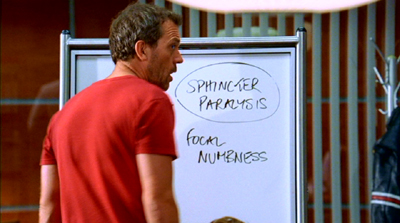
He said, knowingly.
The Lowdown
"Anarchy" is such a misunderstood word. It’s not synonymous with "chaos," though chaos often follows anarchists around. It doesn’t mean do what you want, it just means life without government. In the setting of his rather upscale hospital, Dr. Gregory House is a complete anarchist. He disobeys direct orders from his superiors, he breaks into patients’ houses, he prescribes treatments that haven’t been approved by the FDA — all in the service of saving his current case.
He’s far from an altruist, however, and that is exactly what makes House so much fun to watch. Like most true anarchists, House is also entirely self-absorbed. The salvation of his patients is cast as a game or a puzzle to him. The poor folks lying in isolation rooms with their kidneys failing aren’t people to him; they are projects. With some deft writing, however, House always seems to be aware of his own selfishness. And while he doesn’t make many overt plays to change it, he does recognize the distance it places between him and his co-workers and friends.
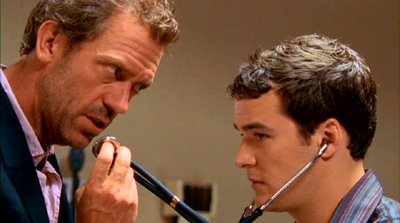
"Never give up your pants."
I maintain that Hugh Laurie is doing some of the best work of his career on this show. He gets to be sardonic, clever, opinionated, and just the right amount of haunted, and there doesn’t seem to be one aspect of House’s character that is beyond him. Of particular note is the way he portrays his familiarity with that gap between himself and his friends. House is perfectly aware that is a diagnostic genius. but also that the impetus for the brilliance comes from his misanthropy, his own crippling medical condition, and his isolation.
House’s situation reminds me of a sequence in Neil Gaiman’s comic miniseries 1604, in which traditional Marvel superheroes are re-imagined in post-Elizabethan times. The scene I’m thinking of involves the proto-Fantastic Four, specifically Reed Richards and Benjamin Grimm. I’m paraphrasing, of course, but the aim is that Grimm is moping about his monstrous condition and Richards replies that he will be unlikely to change, because the universe likes stories, and Grimm is "far more satisfying as a monster."
That’s somewhat true of House as well. He’s so engaging because he approaches matters of human decency, compassion, and propriety from the wrong side. He is an incredibly satisfying monster. Unfortunately, that means he has to function in something of a static situation. He is allowed small measures of growth, but should anything extraordinary happen to him, it would jeopardize what makes him a compelling character. This is addressed directly within the show in this second season. Now it’s an apparent major issue for the third season, which premiered just earlier this week, as of this writing. It’s going to be an interesting experiment, seeing if House can grow and change and still remain and still draw in the audience he has so far.
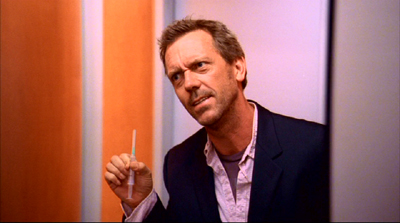
"Anyone pantsless is now fair game."
Devin mentioned recently that he’s in something of a love and hate relationship with the show, and I share the sentiment, if not the specifics. I’ve spent a lot of time on House, which he deserves, but the narrative and technical aspects that support him are at times maddening.
First is the problem that every episode follows from a single formula. It’s a formula similar to that of whodunits, except that, since we’re talking about medicine, it’s more of a whydunit. A good mystery keeps you involved and keeps you guessing; but no matter how familiar you are with, say, Agatha Christie, you’re never going to keep up with House. The solutions — even the mysteries themselves — are well beyond the grasp of mere mortals, so you are required to derive your enjoyment of the show from watching the characters encounter arcane medical terminology and treatment.
As I’ve said, Laurie’s performance allows for exactly that. The supporting characters, unfortunately, are too thin to cadge any real interest from the audience. House’s underlings are defined by their social class, their race, or their feminine stereotypes, and rarely get deeper. Everyone in the show, apart from House, get to experience the "fake growth" that you most often find in sitcoms. In other words, things change over the course of the episode, but by the time the next episode begins, all of that has been jettisoned and everybody starts back at square one.
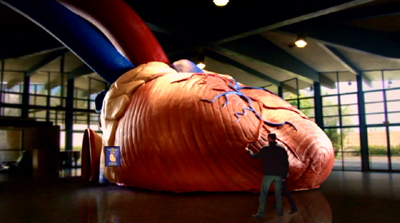
The Grinch served on one too many Salvation Army executive boards.
An example: During the Spring sweeps for season two, Foreman (Epps) survived a potentially crippling illness that was stretched across a two-night event. The episode following, the writers tossed a brief nod in the direction of Foreman’s trials. Beyond that… all was forgotten. House exists in a static environment because he’s interesting there; for the other characters on the show, it doesn’t work so well.
House isn’t a show that focuses on a season-long plot arc, as so many others have been doing recently, so this season can be judged on the merits of its individual episodes. The topics covered range from faith healing to insomnia, broken relationships to jealousy and obsession. The episodes’ morals are generally steeped in sentiment, which contrasts with House’s clinical nature, but not so much as to leave a bad taste in your mouth.
It’s a show with humor, humanity, and a generous dose of authentic cynicism. The flaw that brings it down a few notches is also the quality that makes it interesting: House’s distance, holding everybody — including the audience — at arm’s length.
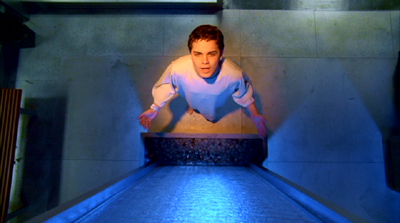
My stars! He’s full of God!
The Package
Twenty-four widescreen episodes on six discs. Plenty of good show content, with four episodes per disc, but the bonuses aren’t so expansive.
There are full-length commentaries on only two of the twenty-four episodes, on "Autopsy" in which house medically kills a young girl in order to diagnose her, and on the (misfire of a) season finale "No Reason," in which House meanders through metaphysical claptrap. Both commentaries are erudite and informational, provided by two exec. producers
There are a couple of alternate takes, dubbed "The Valley Girl Versions," in which the actors switch in "like"-heavy dialogue for the usual high-speed, Gilmore Girls at Med School speeches. These are brief, but funny, because they contain all the same material as the finished takes, just incredibly dumbed down.
Then there’s a lengthy interview with the cast and creators (including exec. producer Bryan Singer) conducted by the
To add a little mortar to the gaping cracks, there’s a blooper reel that demonstrates Laurie needs to return to pure comedy, at least for a bit, and a clip segment that showcases how frequently the disease Lupus is referenced in the show.
7.4 out of 10